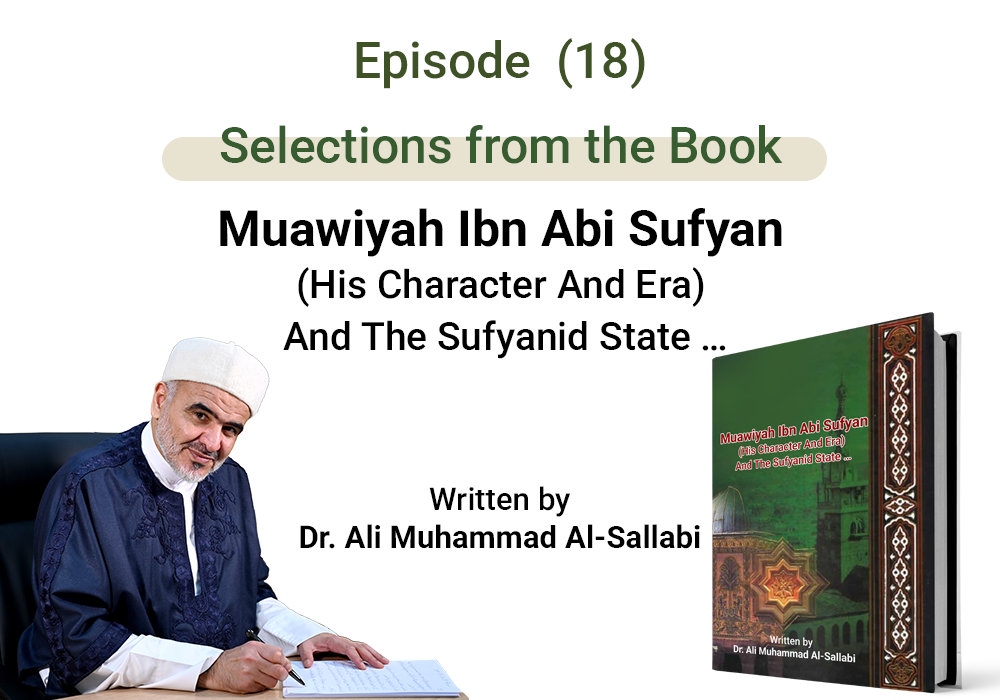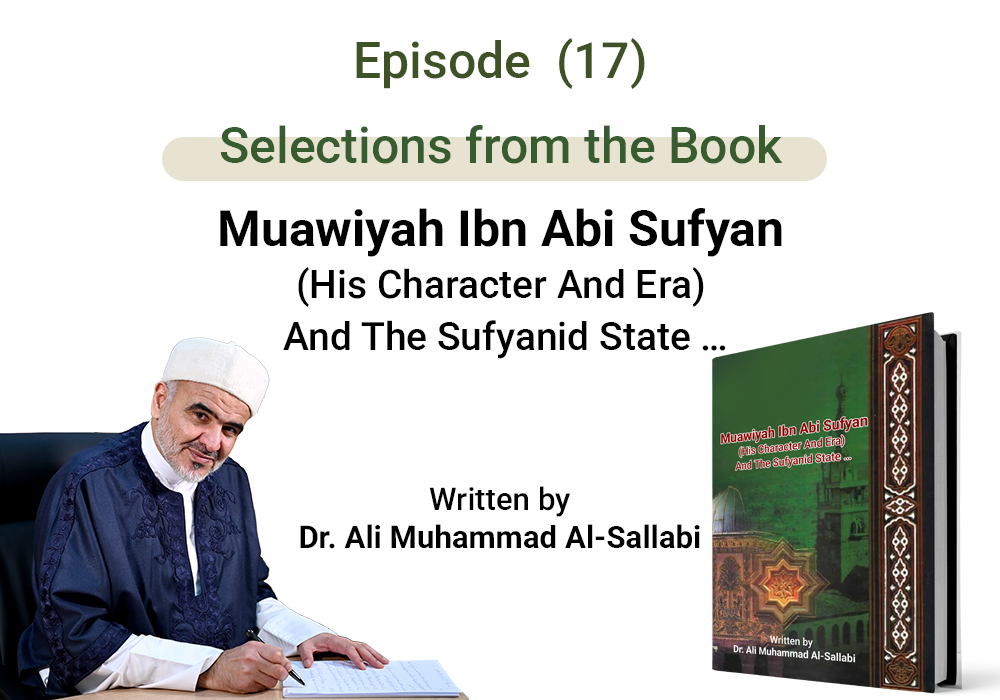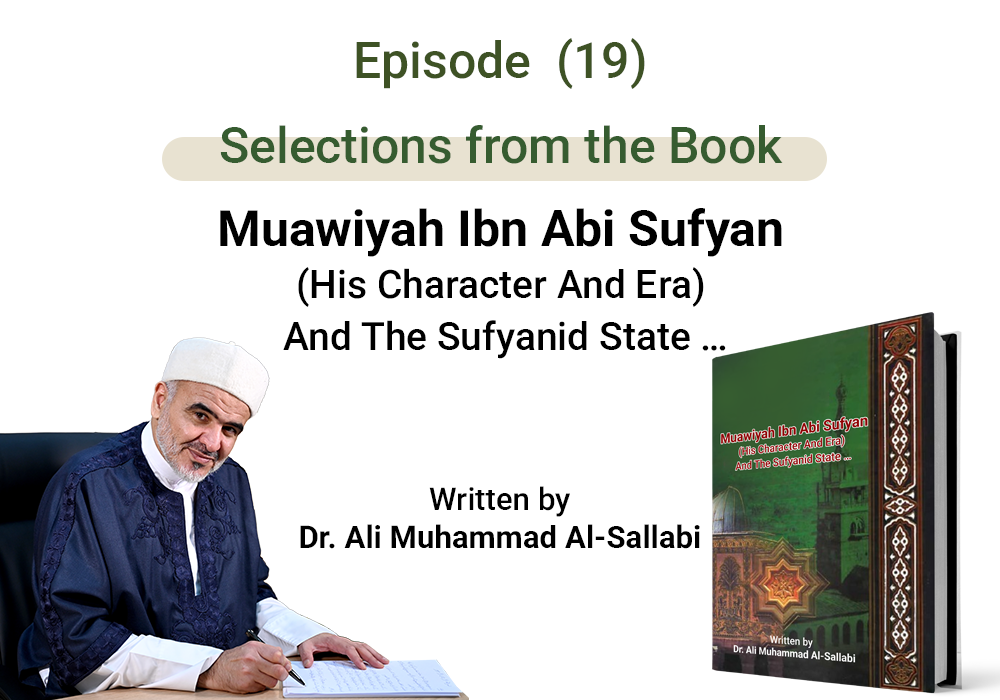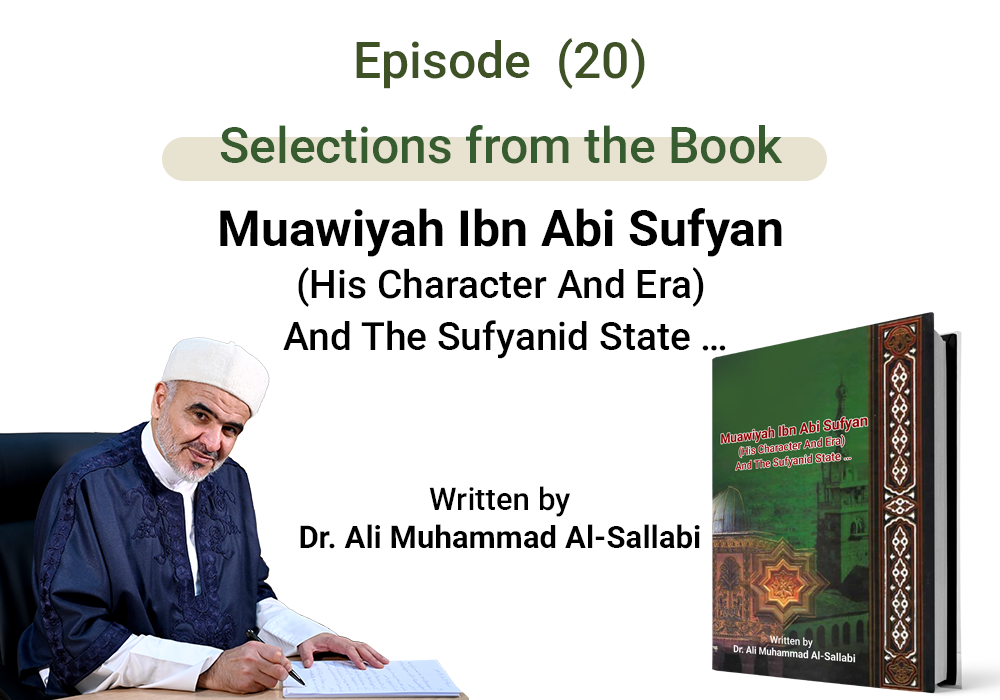The Most Important Reasons And Motives For Reconciliation Between Muawiyah and Al-Hasan, may Allah be pleased with them both
Selections from the Book Muawiyah Ibn Abi Sufyan (His Character And Era) And The Sufyanid State …
Written by Dr. Ali Muhammad al-Sallabi...
Episode (18)
As for the most important reasons and motivations behind the peace that was established between Al-Hasan and Muawiya, they are:
1 - Desire for what is with Allah and the will to reform this Ummah:
Al-Hasan ibn Ali, may Allah be pleased with them both, replied to Nufayr ibn al-Hadrami when he said to him: “People claim that you seek the caliphate”. He said: “The heads of the Arabs were in my hands—they would make peace with whomever I made peace and fight whomever I fought—but I gave it up seeking the pleasure of Allah.”
2 - The Prophet’s (peace be upon him) supplication for him:
The Prophet’s (peace be upon him) supplication that Allah would bring reconciliation through him between two great factions of Muslims was a major factor that motivated Al-Hasan to prepare mentally and strategically for peace, and to overcome the obstacles in its path. This hadith served as the guiding principle for Al-Hasan in his directions, decisions, and way of life. It settled deep within his soul, dominated his feelings and emotions, and became part of his very being. Based on this guidance, and his understanding and internalization of it, he built his reform project, defined its stages, and was certain of its outcomes. The prophetic hadith was a primary driver and central reason for Al-Hasan’s push toward reconciliation.
3 - Preserving the blood of Muslims:
Al-Hasan, may Allah be pleased with him, said: “…I feared that the Day of Judgment would come and seventy thousand—or more or less—people whose neck veins were flowing with blood would come, all of them calling upon Allah for justice: ‘Why was our blood spilled?’”
He also said, may Allah be pleased with him: “Indeed, the command of Allah will come to pass—nothing can repel it even if people dislike it. I do not wish to have from the Ummah of Muhammad even the weight of a mustard seed in exchange for which a drop of blood is spilled. I have come to know what benefits me and what harms me. So return to your places.
4 - Concern for the unity of the Ummah:
At one stage of the reconciliation process, Al-Hasan ibn Ali, may Allah be pleased with them both, stood to address the people and said: “O people! I no longer hold any resentment toward any Muslim. I look out for you just as I look out for myself. I have a view, so do not reject my opinion. What you dislike about unity is better than what you love about division.”
By the grace of Allah and through Al-Hasan’s sincere concern for the unity of the Ummah, that great goal was achieved. He, may Allah be pleased with him, saw that relinquishing the caliphate would preserve Muslim blood and prevent the major harms that would befall the entire Ummah if the conflict continued. These harms included the spilling of blood, ongoing civil strife, severing of family ties, insecurity of travel, neglect of the frontiers, and more. Praise be to Allah, the unity of the Ummah was achieved through his sacrifice of a fleeting worldly position. That year came to be known as “the Year of Unity”, which reflects Al-Hasan’s deep understanding of consequences and his wise consideration of future outcomes.
5 - The assassination of the Commander of the Faithful, Ali, may Allah be pleased with him:
Among the reasons that led Al-Hasan ibn Ali, may Allah be pleased with him, to reconcile was the shock and grief of his father’s assassination. The murder of his father created a major void on the Iraqi front and had a deep psychological impact on Al-Hasan, filling him with sorrow and heartbreak. This great Imam was killed unjustly, and the Khawarij showed no regard for his pioneering role in Islam, his noble virtues, or his immense contributions to the religion. His life was full of values, noble principles, and efforts to uphold the rulings of the Shari‘a at both the state and societal level.
Ali, may Allah be pleased with him, was a guiding landmark of righteousness and a distinguisher between truth and falsehood. It was only natural that Muslims were deeply affected by his loss and felt the great void he left behind. The calamity of his assassination had a profound impact on the Muslims—sorrow enveloped them, their eyes overflowed with tears, and their tongues uttered praise and prayers for mercy upon him. His murder caused Al-Hasan to become disillusioned with the people of Iraq—those who had been showered with the noble character and companionship of the Commander of the Faithful, but were misled by temptations and desires, and deviated from the straight path. Excepted from this are the sincere and faithful among them—those loyal to their religion and to their departed great caliph, may Allah be pleased with him and grant him contentment. His assassination was a powerful blow to the era of the Rashidun caliphate and was one of the reasons for its eventual decline.
6 - The character of Muawiyah:
Al-Hasan ibn Ali handed over the caliphate to Muawiyah even though over forty thousand people had pledged to fight to the death alongside him. Had Muawiyah not been worthy of it, Al-Hasan—the noble grandson—would not have handed it over to him; rather, he would have fought him. Historians and biographers who wrote about Muawiyah’s life mentioned many of his virtues and noble achievements, which will be discussed, Allah willing, later in this book.
7 - The instability of the Iraqi army and the people of Kufa:
The emergence of the Khawarij had already weakened the position of the Commander of the Faithful, Ali, may Allah be pleased with him. Furthermore, the battles of al-Jamal, Siffin, and Nahrawan had caused the people of Iraq to grow weary of war and turn away from it—especially those from al-Sham who fought in Siffin. That devastating battle never left their memory, for it orphaned children, widowed women, and achieved none of their objectives. Had it not been for the peace or arbitration welcomed by the Commander of the Faithful, Ali, and many of his companions, the disaster’s consequences on the Islamic world would have been unimaginable.
This reluctance to march once more with Ali toward al-Sham existed within a portion of the army—those who leaned emotionally toward Muawiyah, even though they knew that Ali was in the right. Thus, Al-Hasan inherited the caliphate while the Iraqi army was in a state of instability and the people of Kufa were uncertain and hesitant. Yet this was not universally true—the army could be reinforced, and there were factions ready to fight, foremost among them Qays ibn Saad al-Khazraji and other commanders
8 - The strength of Muawiyah’s army:
On the other side, Muawiyah, may Allah be pleased with him, was working by all means—both secretly and openly—to weaken the side of the people of Iraq since the time of Ali, may Allah be pleased with him. He exploited the disunity and conflict within their army. Multiple factors contributed to Muawiyah’s military strength: the obedience of his troops, the unity of the people of al-Sham behind him, his administrative experience from governing al-Sham, the stability of his financial resources, and his lack of hesitation to spend wealth in pursuit of what he saw as being in the Ummah’s best interest.
- Ali Muhammad al-Sallabi, Muawiyah Ibn Abi Sufyan (His Character And Era) And The Sufyanid State, pp. 324-329.
- The fifth of the Rashidun Caliphs, Al-Hasan ibn Ali, by Al-Sallabi, p. 358.
- Shiites and Ahl Al-Bayt, p. 379; quoted from Al-Ihtijaj, by Al-Tabarsi, p. 148.
- The Caliphate of Ali ibn Abi Talib, Abdul Hamid Ali, p. 345.
- The prohibition of insulting the Commander of the Faithful, Muawiyah, p. 57.
- Financial considerations and consideration of the consequences of actions, p. 167.
- The Beginning and the End (11/206).
- History of Damascus (14/89).
For further information and review of the sources for the article, see:
The Book of “Muawiyah Ibn Abi Sufyan (His Character And Era) And The Sufyanid State” on the official website of Sheikh Dr. Ali Muhammad al-Sallabi:






